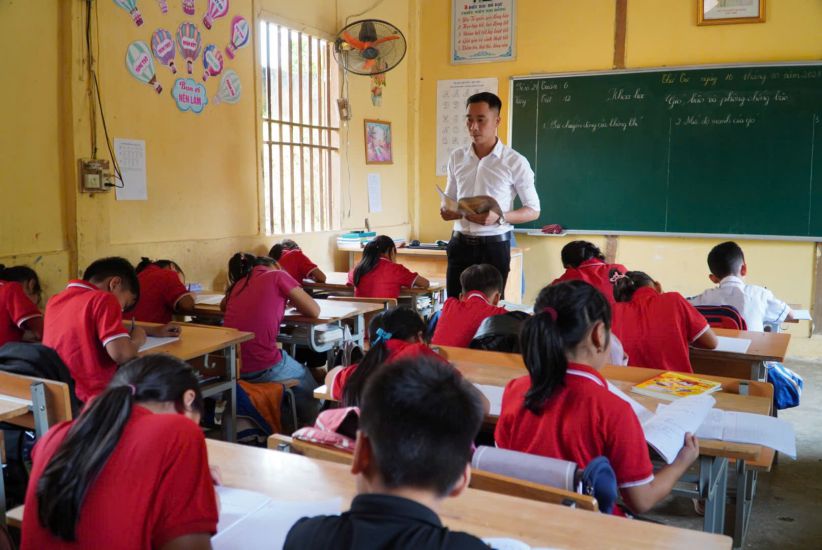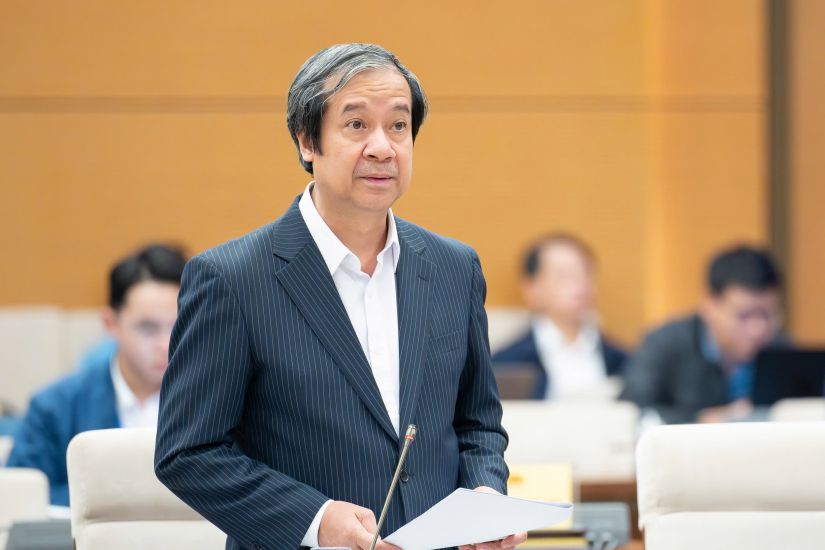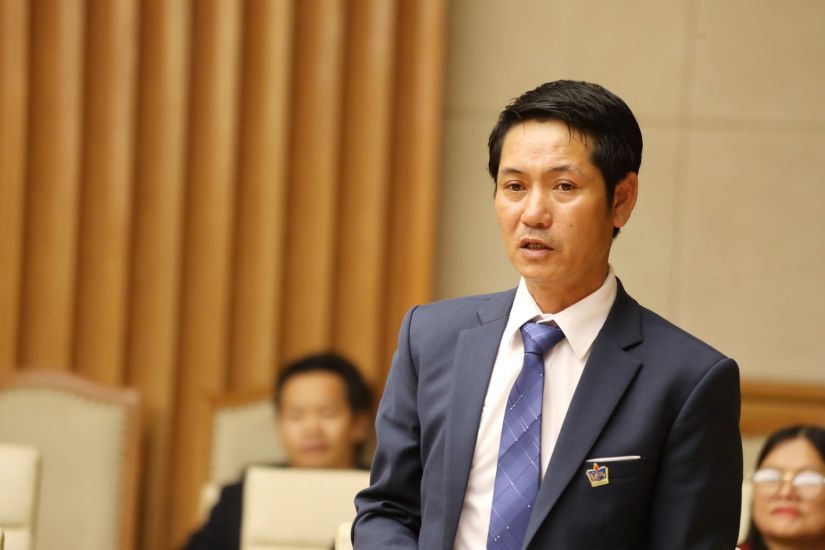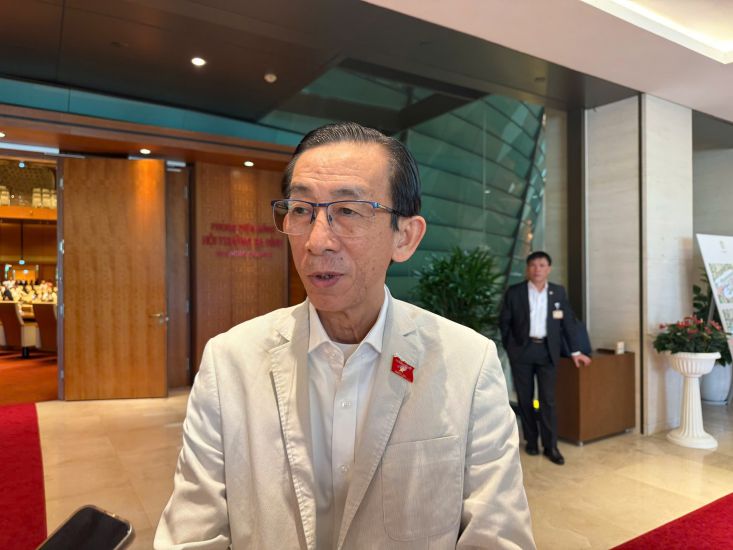Going to school every day is one time to overcome danger
In the mountainous areas west of Nghe An, Mai Son Kindergarten (Nhon Mai commune, Tuong Duong district) is still lit up every morning despite experiencing consecutive storms and floods. The road to the village was eroded, many sections were torn such as frog's jaw, flooded with mud and extremely dangerous. There, Ms. Hoang Thi Lan - Vice Principal - and a team of 20 cadres, teachers, and staff (including 14 teachers in the classroom) still stick to the school, stuck to the classroom in the midst of countless difficulties.
The school currently has 7 class groups with 175 students, of which 170 are children of ethnic minorities, 112 are from poor households. Difficult economic conditions have forced most teachers to leave the lowlands to settle down and stay in boarding schools to maintain teaching.
After each flood, the roads were cut off, many teachers had to push their vehicles across the stream, walking on slippery slopes. There were days when the rain was so heavy that they didn't dare to go alone. A young teacher shared that the feeling of taking up the assignment in Nhon Mai on the first day of the assignment was like going to the battlefield - an experience she had never imagined before.

The difficulty is not only the ruthless terrain. After the flood, many parents were afraid that the road would be dangerous so they let their children stay home from school. The teachers wade into each house, persistently pushing students to return to class, because children in mountainous areas only need to take too long a break before falling into the habit of studying.
The lack of material things makes the work even more difficult. Children's tools and toys are mostly handmade by the teachers from old covers, plastic bottles, and scraps of fabric. "Every time the school receives a pair of new clothes or warm coats for students, their joy is doubled. They are happy, we feel worthy of the hardships they have gone through" - Ms. Hoang Thi Lan shared.
What the collective of teachers here hopes for most is not luxury, but only a road to school to reduce hardship, additional investment in facilities and increased support for students in remote areas.
Teacher shortage - a "bottleneck" that has lasted for many years
Not only facing difficulties in facilities, the shortage of teachers, especially in preschools, remote areas and new subjects of the 2018 General Education Program are also popular and are becoming an urgent problem in the whole industry.
At Sung La - Sa Phin Boarding School for Ethnic Minorities, Mr. Nguyen Van Loi said that the school currently has only one English teacher in charge of 13 classes. Every year, the school asks for quotas from the Department of Education and Training; information on mass media channels but there is no source for admission - he said.
Similar situation occurs in many localities in the Northwest and Central Highlands. In Lai Chau, there is a shortage of facilities, many classrooms are sold solidly or temporarily; teaching equipment is degraded; there is a shortage of educational staff, making it difficult to implement the new program.
According to statistics in May 2025, the country lacks 102,097 preschool and primary school teachers compared to the quota; recent reports show that the actual number may exceed 120,000 people. This directly affects the quality of teaching and puts a lot of overload on the existing team.
The Ministry of Education and Training stated: Although the education sector has achieved many achievements, there are still many systematic "bottlenecks", hindering breakthroughs and affecting national competitiveness.
This is also the reason why Resolution 71 was issued, setting out new and stronger policies and decisions to quickly clear bottlenecks, create breakthroughs in development, modernize and shake up the country's education system.
To implement the policies and orientations of Resolution 71, on November 17, the National Assembly will consider discussing the Draft Resolution of the National Assembly on specific mechanisms and policies to implement Resolution No. 71-NQ/TW dated August 22, 2025 of the Politburo on breakthroughs in education and training development developed and submitted by the Ministry of Education and Training.
Many specific mechanisms will be implemented to create leverage for educational development, solving shortcomings such as Lai Chau province and many localities are facing.
6 truly unique and outstanding mechanisms and policies

Minister of Education and Training Nguyen Kim Son said that the draft resolution stipulates that there are 6 major policies including: First, developing human resources in the education sector. Decentralize to the Director of the Department of Education and Training the right to recruit, transfer, and second teachers, managers, and staff in educational institutions; allow higher education and vocational training institutions to autonomously determine job positions, sign contracts with domestic and foreign experts, implement a mechanism for sharing and using human resources; ensure a minimum vocational allowance of 15% for teachers, 30% for school staff, 100% for teachers in disadvantaged areas, and allow the institution to decide on additional income from non-budgetary sources, regardless of schools at different levels of autonomy...
Second, cooperation in developing educational programs. Prepare a set of unified textbooks for national use from the 2026-2027 school year and aim to provide free of charge by 2030; exempt tuition fees and national defense and security education curricula according to the roadmap; educational institutions are allowed to cooperate with businesses to research, invest, share benefits, intellectual property rights, receive advanced foreign programs according to shortened procedures; allow the establishment of vocational skills councils in key areas, order training of talented human resources...
Third, digital transformation and science and technology in the field of education and training. Prioritize investment in digital infrastructure, digital learning platforms and national databases on education; form innovation centers, startup incubation gardens, commercialize research results, contribute capital with intellectual property; participating enterprises are entitled to a 50% tax reduction for 10 years, then apply a tax rate of 15%; implement a spending mechanism based on output and self-use results, settle expenses according to products...
Fourth, autonomy in international cooperation. Allowing the organization of international conferences and seminars according to a shortened process; exempting personal income tax for the first 12 months and reducing 50% for the next 24 months for foreign experts and scientists to work; allowing the establishment of Vietnamese higher education institutions or branches of higher education institutions abroad.
Fifth, support learners and train highly qualified human resources. Expanding the subjects of preferential credit loans to include households with an average standard of living; implementing a national key scholarship program for doctoral and doctoral students, associated with breakthrough science and technology tasks, priority...
Sixth, investment incentives for education and training. The Provincial People's Council decides to add educational projects to the land use plan, apply procedures to reduce, prioritize the allocation of land funds and surplus headquarters for educational development; ensure a minimum of 20% of State budget expenditure for education and encourage the establishment of a grant fund and be exempted from taxes...
Mr. Nguyen Tran Vy - Principal of Ngoc Linh Ethnic Boarding School (Linh Tea Commune, Da Nang City) - expressed that teachers working in mountainous areas face many difficulties both materially and spiritually. Teachers must be away from their families, cross streams and slopes, face the risk of landslides and flash floods, and bring their children to students in mountainous areas.

According to Mr. Nguyen Tran Vy, in recent times, thanks to the attention of the Party, State and the education sector, the material conditions and student support policies have been significantly improved, but the local budget is still limited. Principal of Ngoc Linh Ethnic Boarding School expressed his hope that the Government and the Ministry of Education and Training will have more preferential policies to attract teachers to work in mountainous areas, increase facilities, and create a happy learning environment for students.
From the teaching experience, Ms. Nguyen Thu Quyen (a history lecturer at Nguyen Trai High School for the Gifted - Hai Phong) realizes that there are three biggest challenges for the current education sector: Regional differences in learning conditions and technology infrastructure, especially when digital transformation is becoming a trend; Pressure to innovate programs and evaluate, causing many teachers to not be able to adapt; Teachers need to be given more confidence, motivation and companionship.
From specific difficulties, Ms. Nguyen Thu Quyen proposed to strongly invest in training digital capacity and research skills of teachers, so that teachers can truly master technology in teaching; build a grassroots education initiative fund, support teachers to deploy innovative teaching models, STEM and digital transformation; encourage cooperation between schools - businesses - research institutes, create conditions for students to learn through hands-on experiences; build a system to record and spread images of educational innovations, so that good models are replicated, contributing to spreading the spirit of creativity.
Ms. Quyen also expressed her hope that in the coming time, the material and spiritual life of the teaching staff will receive more attention, especially the salary and occupational allowance policy, in accordance with the spirit of Resolution 29- NQ/TW, Conclusion 91-KL/TW, Resolution 71- NQ/TW and the Law on Teachers about to take effect.
Delegate Nguyen Thi Viet Nga (Hai Phong Delegation): 3 reasons why it is necessary to issue a special policy on salaries for teachers

I think it is necessary to have a specific salary policy for teachers for 3 reasons: First is a practical and urgent requirement. The teaching staff, especially preschool teachers, teachers in mountainous areas, disadvantaged areas... are falling into a serious shortage. Current income no longer meets the minimum living standard. Second is the strategic requirement, it is impossible to expect "radical and comprehensive innovation in education" if we do not start with proper investment in the teaching staff. Three is a legal requirement. The Law on Teachers has established a special position for teachers, assigning the Government to regulate the classification of teachers' salaries at the highest level. This is a policy that has been decided by the National Assembly - and that Government agencies must implement. However, the level of increase in special allowances needs to be carefully calculated. This requires the coordination of the Ministry of Finance in the assessment and assessment of specific impacts on the national budget, because the teaching force is very large, accounting for a large number of civil servants nationwide, so it needs to be carefully calculated.
Delegate Tran Hoang Ngan (HCMC Delegation): Investing in education is not only about increasing teachers' salaries

One of the most important driving forces to help countries succeed in escaping the middle-income trap is education. Education is the focus, science and technology are the focus. If we only rely on increasing investment or expanding capital, development will not be able to break out. To achieve high income, it must come from thinking, from productivity, from innovation - all of which originate from education. Education must be considered the foundation of development and worthy treatment for the teaching staff is indispensable in this strategy.
I think salary reform in the education sector is necessary. This is a policy that has been approved by the people, approved by the National Assembly and clearly expressed in Resolution 71 of the Politburo.
However, investing in education is not only about increasing teachers' salaries but also investing enough in facilities, laboratories, and practical conditions so that learners can practice skills and access knowledge right in school. It is necessary to place salary policies in a broader context. Along with that is the policy of developing education, investing in people, knowledge, and science. Only then will the new policy go into depth.
Delegate Pham Van Hoa (Dong Thap Delegation): Increase salaries and benefits to improve teaching quality

I support the proposals of the Ministry of Education and Training in the draft Decree regulating salary and allowance policies for teachers as well as the policy of bringing the highest teacher salary in the administrative career salary scale system. When teachers have good salaries, they will focus on teaching expertise, improving the quality of teaching. This will also help minimize extra teaching and learning, especially in person.
PV Group











